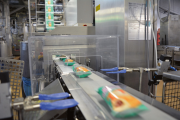Christmas tradition includes the addition of coins to the pudding mix: but in modern food production keeping bits of metal out of seasonal food products is a serious business. One leading specialist bakery is using product inspection solutions from METTLER TOLEDO to make sure we can have our Christmas cake and eat it – safely.
Kuchenmeister has been producing delicious baked goods and confectionery specialities for over 130 years. The medium-sized, family-owned company is the market leader for ready-to-serve cakes in Germany, as well as the international market leader for Baumkuchen and Christmas Stollen. Its 1000 or so employees produce more than 90,000 tonnes of cakes a year, which are distributed worldwide both under the ‘Kuchenmeister’ brand as well as food retailer brands.
The company, which is certified at IFS Higher Level, maintains ten production lines in three-shift operation at its main factory. METTLER TOLEDO’s product inspection equipment is used for foreign body detection and product conformity along the entire production line, from incoming goods through processing to checking packaged products.
Inspection along the line
Kuchenmeister is committed to minimizing risks to consumer and product safety. It uses a variety of product inspection techniques at different points in the process to uphold safety and quality.
For example, the company sources pre-washed raisins for use in its Christmas Stollen, but subjects these to cleaning again prior to processing and then checks them for foreign bodies using x-ray inspection. “By checking incoming goods for foreign bodies, we minimise the risk of small stones or metal parts causing damage to production machines and resulting in downtime further down the line,” explains Thomas Engel, Head of Quality Management at Kuchenmeister.
The ingredients inspected in goods-inwards are processed into various products such as stollen or pound cakes and baked. Dynamic checkweighers determine whether the cake moulds are filled with the intended amount of batter. Thomas Engel explains, “The right amount of batter is not only an important factor in achieving the correct final weight. It is also a central quality parameter for ensuring the optimum level of cooking and browning.”
Dynamic checkweighers therefore continuously optimize the filling process by means of fully automated feedback control. If the checkweighers detect a tendency to overfill or underfill, they automatically trigger a reduction or increase in the volume of batter at the filling station. This effectively avoids costly product waste caused by overfilling and ensures compliance with regulations by eliminating underfill.
X-ray inspection systems and metal detectors at critical control points (CCPs) also carry out checks for foreign objects before the baked goods are shipped. The individual product, its ingredients and the type of packaging determine which technologies are used. For homogeneous products such as pastry cases or croissants, the company relies on metal detection technology. This detects foreign bodies from ferrous metals such as chromium, non-ferrous metals such as brass and aluminium, plus magnetic and non-magnetic stainless steel.
Foreign bodies in products such as pound cakes are detected using x-ray inspection systems. These have a horizontal conveyor belt and inspect up to 3000 units/hour. Contaminated products are removed from the production line by means of a pusher reject device.
Santa’s little helpers
You can’t cancel Christmas, so it is imperative that production lines are kept running at their optimum to keep up with demand. As Thomas Engel explains: “We bake thousands of products per hour. It is easy to see what damage can be caused by several hours of downtime on a production line – not to mention possible penalties if we are unable to deliver our food retailer brands on time. So, we have a Comprehensive Care Service Contract in place with METTLER TOLEDO.”
The contract not only covers the costs associated with labour and spare parts, but also regular maintenance and cleaning measures; as well as functional tests including, in particular, the exact scheduling of maintenance measures. The service intervals agreed in the Comprehensive Care Service mean that Kuchenmeister is able to avoid maintenance-related production losses.
Operators, service and maintenance staff and quality managers are trained regularly by METTLER TOLEDO to ensure they are able to optimally operate and maintain the equipment. This strategy has enabled Kuchenmeister to increase its overall system effectiveness and simplify the provision of evidence as part of its auditing procedures.
Using the latest product inspection solutions, combined with expert training and technical support whenever it is required, Kuchenmeister ensures that food safety and quality are not just for Christmas.


